- Home
- Patrick Rothfuss
Kingkiller Chronicle [01] The Name of the Wind Page 2
Kingkiller Chronicle [01] The Name of the Wind Read online
Page 2
His friends jumped off their stools and hurried over at the sight of him. “I’m fine,” he said as he made his slow way into the common room. His eyes were wild around the edges, like a skittish horse. “I’m fine. I’m fine.”
He dropped the bundled blanket onto the nearest table where it knocked hard against the wood, as if it were full of stones. His clothes were crisscrossed with long, straight cuts. His grey shirt hung in loose tatters except where it was stuck to his body, stained a dark, sullen red.
Graham tried to ease him into a chair. “Mother of God. Sit down, Carter. What happened to you? Sit down.”
Carter shook his head stubbornly. “I told you, I’m fine. I’m not hurt that bad.”
“How many were there?” Graham said.
“One,” Carter said. “But it’s not what you think—”
“Goddammit. I told you, Carter,” Old Cob burst out with the sort of frightened anger only relatives and close friends can muster. “I told you for months now. You can’t go out alone. Not even as far as Baedn. It ain’t safe.” Jake laid a hand on the old man’s arm, quieting him.
“Just take a sit,” Graham said, still trying to steer Carter into a chair. “Let’s get that shirt off you and get you cleaned up.”
Carter shook his head. “I’m fine. I got cut up a little, but the blood is mostly Nelly’s. It jumped on her. Killed her about two miles outside town, past the Oldstone Bridge.”
A moment of serious silence followed the news. The smith’s prentice laid a sympathetic hand on Carter’s shoulder. “Damn. That’s hard. She was gentle as a lamb, too. Never tried to bite or kick when you brought her in for shoes. Best horse in town. Damn. I’m…” He trailed off. “Damn. I don’t know what to say.” He looked around helplessly.
Cob finally managed to free himself from Jake. “I told you,” he repeated, shaking a finger in Carter’s direction. “There’s folks out lately that would kill you for a pair of pennies, let alone a horse and cart. What are you going to do now? Pull it yourself?”
There was a moment of uncomfortable quiet. Jake and Cob glared at each other while the rest seemed at a loss for words, unsure of how to comfort their friend.
The innkeeper moved carefully through the silence. Arms full, he stepped nimbly around Shep and began to arrange some items on a nearby table: a bowl of hot water, shears, some clean linen, a few glass bottles, needle and gut.
“This never would have happened if he’d listened to me in the first place,” Old Cob muttered. Jake tried to quiet him, but Cob brushed him aside. “I’m just tellin’ the truth. It’s a damn shame about Nelly, but he better listen now or he’ll end up dead. You don’t get lucky twice with those sort of men.”
Carter’s mouth made a thin line. He reached out and pulled the edge of the bloody blanket. Whatever was inside flipped over once and snagged on the cloth. Carter tugged harder and there was a clatter like a bag of flat river stones upended onto the tabletop.
It was a spider as large as a wagon wheel, black as slate.
The smith’s prentice jumped backward and hit a table, knocking it over and almost falling to the ground himself. Cob’s face went slack. Graham, Shep, and Jake made wordless, startled sounds and moved away, raising their hands to their faces. Carter took a step backward that was almost like a nervous twitch. Silence filled the room like a cold sweat.
The innkeeper frowned. “They can’t have made it this far west yet,” he said softly.
If not for the silence, it is unlikely anyone would have heard him. But they did. Their eyes pulled away from the thing on the table to stare mutely at the red-haired man.
Jake found his voice first. “You know what this is?”
The innkeeper’s eyes were distant. “Scrael,” he said distractedly. “I’d thought the mountains—”
“Scrael?” Jake broke in. “Blackened body of God, Kote. You’ve seen these things before?”
“What?” The red-haired innkeeper looked up sharply, as if suddenly remembering where he was. “Oh. No. No, of course not.” Seeing that he was the only one within arm’s length of the dark thing, he took a measured step away. “Just something I heard.” They stared at him. “Do you remember the trader that came through about two span ago?”
They all nodded. “Bastard tried to charge me ten pennies for a half-pound of salt,” Cob said reflexively, repeating the complaint for perhaps the hundredth time.
“Wish I’d bought some,” Jake mumbled. Graham nodded a silent agreement.
“He was a filthy shim,” Cob spat, seeming to find comfort in the familiar words. “I might pay two in a tight time, but ten is robbery.”
“Not if there are more of those on the road,” Shep said darkly.
All eyes went back to the thing on the table.
“He told me he’d heard of them over near Melcombe,” Kote said quickly, watching everyone’s faces as they studied the thing on the table. “I thought he was just trying to drive up his prices.”
“What else did he say?” Carter asked.
The innkeeper looked thoughtful for a moment, then shrugged. “I didn’t get the whole story. He was only in town for a couple hours.”
“I don’t like spiders,” the smith’s prentice said. He remained on the other side of a table some fifteen feet away. “Cover it up.”
“It’s not a spider,” Jake said. “It’s got no eyes.”
“It’s got no mouth either,” Carter pointed out. “How does it eat?”
“What does it eat?” Shep said darkly.
The innkeeper continued to eye the thing curiously. He leaned closer, stretching out a hand. Everyone edged even farther away from the table.
“Careful,” Carter said. “Its feet are sharp like knives.”
“More like razors,” Kote said. His long fingers brushed the scrael’s black, featureless body. “It’s smooth and hard, like pottery.”
“Don’t go messing with it,” the smith’s prentice said.
Moving carefully, the innkeeper took one of the long, smooth legs and tried to break it with both hands like a stick. “Not pottery,” he amended. He set it against the edge of the table and leaned his weight against it. It broke with a sharp crack. “More like stone.” He looked up at Carter. “How did it get all these cracks?” He pointed at the thin fractures that crazed the smooth black surface of the body.
“Nelly fell on it,” Carter said. “It jumped out of a tree and started to climb all over her, cutting her up with its feet. It moved so fast. I didn’t even know what was going on.” Carter finally sank into the chair at Graham’s urging. “She got tangled in her harness and fell on it, broke some of its legs. Then it came after me, got on me, crawling all over.” He crossed his arms in front of his bloody chest and shuddered. “I managed to get it off me and stomped it hard as I could. Then it got on me again….” He trailed off, his face ashen.
The innkeeper nodded to himself as he continued to prod the thing. “There’s no blood. No organs. It’s just grey inside.” He poked it with a finger. “Like a mushroom.”
“Great Tehlu, just leave it alone,” the smith’s prentice begged. “Sometimes spiders twitch after you kill them.”
“Listen to yourselves,” Cob said scathingly. “Spiders don’t get big as pigs. You know what this is.” He looked around, making eye contact with each of them. “It’s a demon.”
They looked at the broken thing. “Oh, come on now,” Jake said, disagreeing mostly out of habit. “It’s not like…” He made an inarticulate gesture. “It can’t just…”
Everyone knew what he was thinking. Certainly there were demons in the world. But they were like Tehlu’s angels. They were like heroes and kings. They belonged in stories. They belonged out there. Taborlin the Great called up fire and lightning to destroy demons. Tehlu broke them in his hands and sent them howling into the nameless void. Your childhood friend didn’t stomp one to death on the road to Baedn-Bryt. It was ridiculous.
Kote ran his hand through his red hair, the
n broke the silence. “There’s one way to tell for sure,” he said, reaching into his pocket. “Iron or fire.” He brought out a bulging leather purse.
“And the name of God,” Graham pointed out. “Demons fear three things: cold iron, clean fire, and the holy name of God.”
The innkeeper’s mouth pressed itself into a straight line that was not quite a frown. “Of course,” he said as he emptied his purse onto the table then fingered through the jumbled coins: heavy silver talents and thin silver bits, copper jots, broken ha’pennies, and iron drabs. “Does anyone have a shim?”
“Just use a drab,” Jake said. “That’s good iron.”
“I don’t want good iron,” the innkeeper said. “A drab has too much carbon in it. It’s almost steel.”
“He’s right,” the smith’s prentice said. “Except it’s not carbon. You use coke to make steel. Coke and lime.”
The innkeeper nodded deferentially to the boy. “You’d know best, young master. It’s your business after all.” His long fingers finally found a shim in the pile of coins. He held it up. “Here we are.”
“What will it do?” Jake asked.
“Iron kills demons,” Cob’s voice was uncertain, “but this one’s already dead. It might not do anything.”
“One way to find out.” The innkeeper met each of their eyes briefly, as if measuring them. Then he turned purposefully back to the table, and they edged farther away.
Kote pressed the iron shim to the black side of the creature, and there was a short, sharp crackling sound, like a pine log snapping in a hot fire. Everyone startled, then relaxed when the black thing remained motionless. Cob and the others exchanged shaky smiles, like boys spooked by a ghost story. Their smiles went sour as the room filled with the sweet, acrid smell of rotting flowers and burning hair.
The innkeeper pressed the shim onto the table with a sharp click. “Well,” he said, brushing his hands against his apron. “I guess that settles that. What do we do now?”
Hours later, the innkeeper stood in the doorway of the Waystone and let his eyes relax to the darkness. Footprints of lamplight from the inn’s windows fell across the dirt road and the doors of the smithy across the way. It was not a large road, or well traveled. It didn’t seem to lead anywhere, as some roads do. The innkeeper drew a deep breath of autumn air and looked around restlessly, as if waiting for something to happen.
He called himself Kote. He had chosen the name carefully when he came to this place. He had taken a new name for most of the usual reasons, and for a few unusual ones as well, not the least of which was the fact that names were important to him.
Looking up, he saw a thousand stars glittering in the deep velvet of a night with no moon. He knew them all, their stories and their names. He knew them in a familiar way, the way he knew his own hands.
Looking down, Kote sighed without knowing it and went back inside. He locked the door and shuttered the wide windows of the inn, as if to distance himself from the stars and all their varied names.
He swept the floor methodically, catching all the corners. He washed the tables and the bar, moving with a patient efficiency. At the end of an hour’s work, the water in his bucket was still clean enough for a lady to wash her hands in.
Finally, he pulled a stool behind the bar and began to polish the vast array of bottles nestled between the two huge barrels. He wasn’t nearly as crisp and efficient about this chore as he had been with the others, and it soon became obvious the polishing was only an excuse to touch and hold. He even hummed a little, although he did not realize it, and would have stopped himself if he had known.
As he turned the bottles in his long, graceful hands the familiar motion eased a few tired lines from his face, making him seem younger, certainly not yet thirty. Not even near thirty. Young for an innkeeper. Young for a man with so many tired lines remaining on his face.
Kote came to the top of the stairs and opened the door. His room was austere, almost monkish. There was a black stone fireplace in the center of the room, a pair of chairs, and a small desk. The only other furniture was a narrow bed with a large, dark chest at its foot. Nothing decorated the walls or covered the wooden floor.
There were footsteps in the hall, and a young man stepped into the room carrying a bowl of stew that steamed and smelled of pepper. He was dark and charming, with a quick smile and cunning eyes. “You haven’t been this late in weeks,” he said as he handed over the bowl. “There must have been good stories tonight, Reshi.”
Reshi was another of the innkeeper’s names, a nickname almost. The sound of it tugged one corner of his mouth into a wry smile as he sank into the deep chair in front of the fire. “So, what did you learn today, Bast?”
“Today, master, I learned why great lovers have better eyesight than great scholars.”
“And why is that, Bast?” Kote asked, amusement touching the edges of his voice.
Bast closed the door and returned to sit in the second chair, turning it to face his teacher and the fire. He moved with a strange delicacy and grace, as if he were close to dancing. “Well Reshi, all the rich books are found inside where the light is bad. But lovely girls tend to be out in the sunshine and therefore much easier to study without risk of injuring one’s eyes.”
Kote nodded. “But an exceptionally clever student could take a book out-side, thus bettering himself without fear of lessening his much-loved faculty of sight.”
“I thought the same thing, Reshi. Being, of course, an exceptionally clever student.”
“Of course.”
“But when I found a place in the sun where I could read, a beautiful girl came along and kept me from doing anything of the sort,” Bast finished with a flourish.
Kote sighed. “Am I correct in assuming you didn’t manage to read any of Celum Tinture today?”
Bast managed to look somewhat ashamed.
Looking into the fire, Kote tried to assume a stern face and failed. “Ah Bast, I hope she was lovely as a warm wind in the shade. I’m a bad teacher to say it, but I’m glad. I don’t feel up to a long bout of lessons right now.” There was a moment of silence. “Carter was attacked by a scraeling tonight.”
Bast’s easy smile fell away like a cracked mask, leaving his face stricken and pale. “The scrael?” He came halfway to his feet as if he would bolt from the room, then gave an embarrassed frown and forced himself back down into his chair. “How do you know? Who found his body?”
“He’s still alive, Bast. He brought it back. There was only one.”
“There’s no such thing as one scraeling,” Bast said flatly. “You know that.”
“I know,” Kote said. “The fact remains there was only one.”
“And he killed it?” Bast said. “It couldn’t have been a scraeling. Maybe—”
“Bast, it was one of the scrael. I saw it.” Kote gave him a serious look. “He was lucky, that’s all. Even so he was badly hurt. Forty-eight stitches. I used up nearly all my gut.” Kote picked up his bowl of stew. “If anyone asks, tell them my grandfather was a caravan guard who taught me how to clean and stitch a wound. They were too shocked to ask about it tonight, but tomorrow some of them might get curious. I don’t want that.” He blew into his bowl, raising a cloud of steam around his face.
“What did you do with the body?”
“I didn’t do anything with it,” Kote said pointedly. “I am just an innkeeper. This sort of thing is quite beyond me.”
“Reshi, you can’t just let them muddle through this on their own.”
Kote sighed. “They took it to the priest. He did all the right things for all the wrong reasons.”
Bast opened his mouth, but Kote continued before he could say anything. “Yes, I made sure the pit was deep enough. Yes, I made sure there was rowan wood in the fire. Yes, I made sure it burned long and hot before they buried it. And yes, I made sure that no one kept a piece of it as a souvenir.” He scowled, his eyebrows drawing together. “I’m not an idiot, you know.”
&nb
sp; Bast visibly relaxed, settling back into his chair. “I know you’re not, Reshi. But I wouldn’t trust half these people to piss leeward without help.” He looked thoughtful for a moment. “I can’t imagine why there was only one.”
“Maybe they died coming over the mountains,” Kote suggested. “All but this one.”
“It’s possible,” Bast admitted reluctantly.
“Maybe it was that storm from a couple days back,” Kote pointed out. “A real wagon-tipper, as we used to say back in the troupe. All the wind and rain might have scattered one loose from the pack.”
“I like your first idea better, Reshi,” Bast said uncomfortably. “Three or four scrael would go through this town like…like…”
“Like a hot knife through butter?”
“More like several hot knives through several dozen farmers,” Bast said dryly. “These people can’t defend themselves. I bet there aren’t six swords in this whole town. Not that swords would do much good against the scrael.”
There was a long moment of thoughtful silence. After a moment Bast began to fidget. “Any news?”
Kote shook his head. “They didn’t get to the news tonight. Carter disrupted things while they were still telling stories. That’s something, I suppose. They’ll be back tomorrow night. It’ll give me something to do.”
Kote poked his spoon idly into the stew. “I should have bought the scrael from Carter,” he mused. “He could’ve used the money for a new horse. People would have come from all over to see it. We could have had some business for a change.”
Bast gave him a speechless, horrified look.
Kote made a pacifying gesture with the hand that held the spoon. “I’m joking, Bast.” He gave a weak smile. “Still, it would have been nice.”
“No Reshi, it most certainly would not have been nice,” Bast said emphatically. “‘People would have come from all over to see it,’” he repeated derisively. “Indeed.”
“The business would have been nice,” Kote clarified. “Busy-ness would be nice.” He jabbed his spoon into the stew again. “Anything would be nice.”
They sat for a long moment. Kote scowling down into the bowl of stew in his hands, his eyes far away. “It must be awful for you here, Bast,” he said at last. “You must be numb with boredom.”

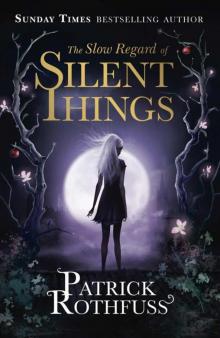 The Slow Regard of Silent Things
The Slow Regard of Silent Things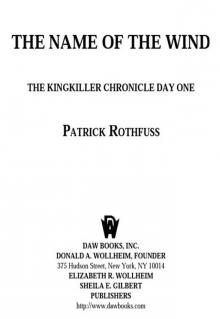 The Name of the Wind
The Name of the Wind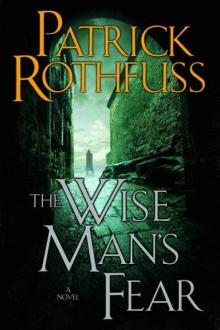 The Wise Man's Fear
The Wise Man's Fear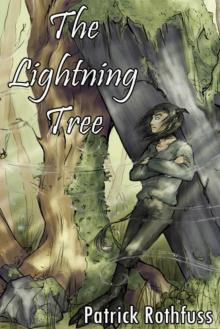 The Lightning Tree
The Lightning Tree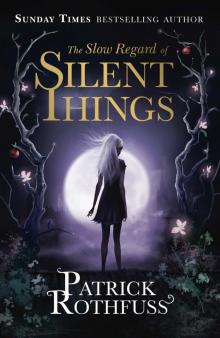 The Slow Regard of Silent Things: A Kingkiller Chronicle Novella (The Kingkiller Chronicle)
The Slow Regard of Silent Things: A Kingkiller Chronicle Novella (The Kingkiller Chronicle)![Kingkiller Chronicle [01] The Name of the Wind Read online](http://i1.bookreadfree.com/i/03/24/kingkiller_chronicle_01_the_name_of_the_wind_preview.jpg) Kingkiller Chronicle [01] The Name of the Wind
Kingkiller Chronicle [01] The Name of the Wind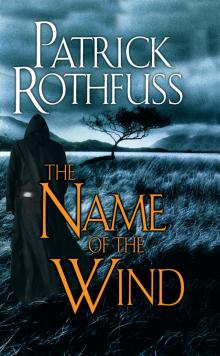 The Name of the Wind tkc-1
The Name of the Wind tkc-1